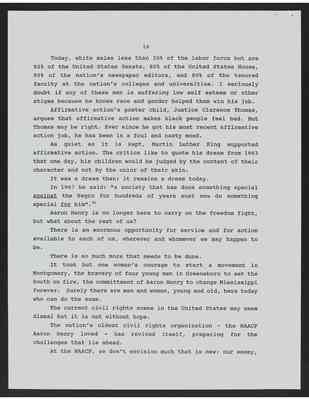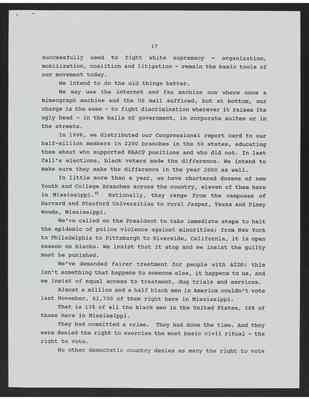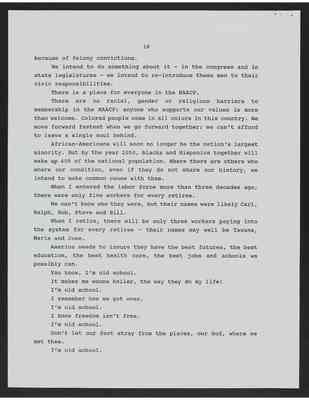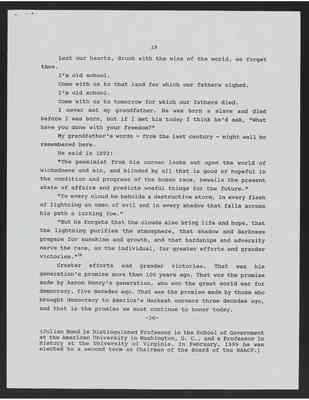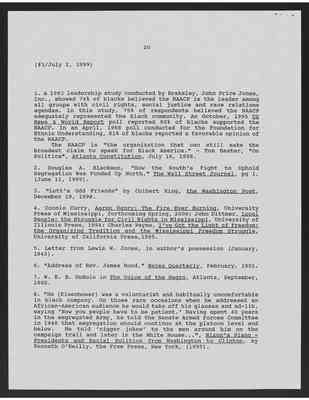Pages
16
16
Today, white males less than 30% of the labor force but are 92% of the United States Senate, 80% of the United States House, 90% of the nation's newspaper editors, and 80% of the tenured faculty at the nation's colleges and universities. I seriously doubt if any of these men is suffering low self esteem or other stigma because he knows race and gender helped them win his job.
Affirmative action's poster child, Justice Clarence Thomas, argues that affirmative action makes black people feel bad. But Thomas may be right. Ever since he got his most recent affirmative action job, he has been in a foul and nasty mood.
As quiet as it is kept, Martin Luther King supported affirmative action. The critics like to quote his dream from 1963 that one day, his children would be judged by the content of their character and not by the color of their skin.
It was a dream then; it remains a dream today.
In 1967 he said: "a society that has done something special against the Negro for hundreds of years must now do something special for him".14
Aaron Henry is no longer here to carry on the freedom fight, but what about the rest of us?
There is an enormous opportunity for service and for action available to each of us, wherever and whomever we may happen to be.
There is so much more that needs to be done.
It took but one woman's courage to start a movement in Montgomery, the bravery of four young men in Greensboro to set the South on fire, the committment of Aaron Henry to change Mississippi forever. Surely there are men and women, young and old, here today who can do the same.
The current civil rights scene in the United States may seem dismal but it is not without hope.
The nation's oldest civil rights organization - the NAACP Aaron Henry loved - has revived itself, preparing for the challenges that lie ahead.
At the NAACP, we don't envision much that is new; our enemy,
17
17
successfully used to fight white supremacy - organization, mobilization, coalition and litigation - remain the basic tools of our movement today.
We intend to do the old things better.
We may use the internet and fax machine now where once a mimeograph machine and the US mail sufficed, but at bottom, our charge is the same - to fight discrimination wherever it raises its ugly head - in the halls of government, in corporate suites or in the streets.
In 1998, we distributed our Congressional report card to our half-million mmembers in 2200 branches in the 50 states, educating them about who supported NAACP positions and who did not. In last fall's elections, black voters made the difference. We intend to make sure they make the difference in the year 2000 as well.
In little more than a year, we have chartered dozens of new Youth and College Branches across the country, eleven of them here in Mississippi.15 Nationally, they range from the campuses of Harvard and Stanford Universities to the rural Jasper, Texas and Piney Woods, Mississippi.
We've called on the President to take immediate steps to halt the epidemic of police violence against minorities; from New York to Philadelphia to Pittsburgh to Riverside, California, it is open season on blacks. We insist that it stop and we insist the guilty must be published.
We've demanded fairer treatment for people with AIDS; this isn't something that happens to someone else, it happens to us, and we insist of equal access to treatment, dug trials and services.
Almost a million and a half black men in America couldn't vote last November, 81,700 of them right here in Mississippi.
This is 13% of all the black men in the United States, 28% of those here in Mississippi.
They had committed a crime. They had done the time. And they were denied the right to exercise the most basic civil ritual - the right to vote.
No other democratic country denies as many the right to vote
18
18
because of felony convictions.
We intend to do something about it - in the congress and in state legislatures - we intend to re-introduce these men to their civic responsibilites.
There is a place for everyone in the NAACP.
There are no racial, gender or religious barriers to membership in the NAACP; anyone who supports our values is more than welcome. Colored people come in all colors in this country. We move forward fastest when we go forward together; we can't afford to leave a single soul behind.
African-Americans will soon no longer be the nation's largest minority. But by the year 2050, blacks and Hispanics together will make up 40% of the national population. Where there are others who share our condition, even if they do not share our history, we intend to make common cause with them.
When I entered the labor force more than three decades ago, there were only five workers for every retiree.
We can't know who they were, but their names were likely Carl, Ralph, Bob, Steve and Bill.
When I retire, there will be only three workers paying into the system for every retiree - their names may well be Tawana, Maria and Jose
America needs to insure they have the best futures, the best education, the best health care, the best jobs and schools we possibly can.
You know, I'm old school.
It makes me wanna holler, the way they do my life!
I'm old school.
I remember how we got over.
I'm old school.
I know freedom isn't free.
I'm old school.
Don't let our feet stray from the places, our God, where we met thee.
I'm old school.
19
19
Lest our hearts, drunk with the wine of the world, we forget thee.
I'm old school.
Come with us to that land for which our fathers sighed.
I'm old school.
Come with us to tomorrow for which our fathers died.
I never met my grandfather. He was born a slave and died before I was born, but if I met him today I think he'd ask, "What have you done with your freedom?"
My grandfather's words - from the last century - might well be remembered here.
He said in 1892:
"The pessimist from his corner looks out upon the world of wickedness and sin, and blinded by all that is good or hopeful in the condition and progress of the human race, bewaits the present state of affairs and predicts woeful things for the future."
"In every cloud he beholds a destructive storm, in every flash of lightning an omen of evil and in every shadow that falls across his path a lurking foe."
"But he forgets that the clouds also bring life and hope, that the lightning purifies the atmosphere, that shadow and darkness prepare for sunshine and growth, and that hardships and adversity nerve the race, as the individual, for greater efforts and grander victories."16
Greater efforts and grander victories. That was his generation's promise more than 100 years ago. That was the promise made by Aaron Henry's generation, who won the great world war for democracy, five decades ago. That was the promise made by those who brought demoracy to America's darkest corners three decades ago, and that is the promise we must continue to honor today.
-30-
(Julian Bond is Distinguished Professor in the School of Government at the American University in Washington, D. C., and a Professor in History at the University of Virginia. In February, 1999 he was elected to a second term as Chairman of the Board of the NAACP.)
20
20
(#3/July 2, 1999)
1. A 1993 leadership study conducted by Brakeley, John Price Jones, Inc. showed 74% of blacks believed the NAACP is the leader among all groups with civil rights, social justice and race relations agendas. In this study, 75% of respondents believed the NAACP adequately represented the black community. An October, 1995 US News & World Report poll reported 90% of blacks supported the NAACP. In an April, 1998 poll conducted for the Foundation for Ethnic Understanding, 81% of blacks reported a favorable opinion of the NAACP.
The NAACP is "the organization that can still make the broadest claim to speak for Black America." - Tom Baxter, "On Politics", Atlanta Constitution, July 16, 1998.
2. Douglas A. Blackmon, "How the South's Fight to Uphold Segregation Was Funded Up North," The Wall Street Journal, pg 1, (June 11, 1999).
3. "Lott's Odd Friends" by Colbert King, the Washington Post, December 19, 1998.
4. Connie Curry, Aaron Henry: The Fire Ever Burning, University Press of Mississippi, forthcoming Spring, 2000; John Dittmer, Local People: the Struggle for Civil Rights in Mississippi, University of Illinois Press, 1994; Charles Payne, I've Got the Light of Freedom: the Organizing Tradition and the Mississippi Freedom Struggle, University of California Press, 1995.
5. Letter from Lewis W. Jones, in author's possession (January, 1945).
6. "Address of Rev. James Bond," Berea Quarterly, February, 1901.
7. W. E. B. DuBois in The Voice of the Negro, Atlanta, September, 1905.
8. "He (Eisenhower) was a voluntarist and habitually uncomfortable in black company. On those rare occasions when he addressed an African-American audience he would take off his glasses and ad-lib, saying 'Now you people have to be patient.' Having spent 40 years in the segregated Army, he told the Senate Armed Forces Committee in 1948 that segregation should continue at the platoon level and below. He told 'nigger jokes' to the men around him on the campaign trail and later in the White House...", Nixon's Piano - Presidents and Racial Politics from Washington to Clinton, by Kenneth O'Reilly, the Free Press, New York, (1995).
